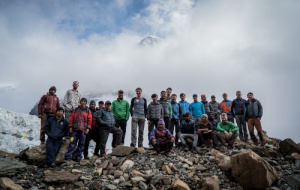Dhaulagiri iron expedition
 Dr Keith Dorrington, Tutorial Fellow in Medicine and Biomedical Sciences, reports exciting results published in the European Respiratory Journal of a study in which he administered large single doses of intravenous iron to half of the 18 members of a military climbing expedition to the Himalayan peak of Dhaulagiri (and salty water, as a control, to the other half).
Dr Keith Dorrington, Tutorial Fellow in Medicine and Biomedical Sciences, reports exciting results published in the European Respiratory Journal of a study in which he administered large single doses of intravenous iron to half of the 18 members of a military climbing expedition to the Himalayan peak of Dhaulagiri (and salty water, as a control, to the other half).
The randomised, controlled, double-blind clinical physiology study examined how the heart and lungs function in the low-oxygen environment of very high altitude with different levels of iron in the body. We normally associate the body’s iron almost exclusively with keeping the red blood cells full of haemoglobin. Here the focus was different. In these young and healthy climbing participants the iron made no difference to the rise in haemoglobin concentration on climbing to 5,100 m over 10 days, but it did strikingly increase the amount of oxygen bound to the haemoglobin in the arterial blood, and reduce the strain on the right side of the heart that pumps blood into the lungs.
The lead authors of the study are Lieutenant Colonel David Holdsworth, a cardiologist, and Dr Matthew Frise, a consultant intensivist. The eight authors of this study (of which Dr Dorrington, an anaesthetist, was one of the “home team” in this case) suggest that these results from the mountains are not only relevant to future climbing expeditions, but will help in the management of patients in whom reducing the resistance of blood vessels in the lungs by administering iron may improve the lungs’ gas exchange as well as reducing heart strain. Diseases include chronic bronchitis, pulmonary oedema, embolism, and some congenital heart conditions.
You can read the article on the European Respiratory Journal website.
Published: 14 October 2020
